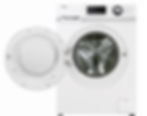Running A Washing Machine on Your Solar Power System
- SolarKobo
- Sep 19, 2022
- 4 min read
Updated: Jun 21, 2023
In developed countries, at least since after the Second World War, washing machines are household necessities. Most people in developed countries would not imagine life without washing machines. Hand-washing is reserved for fragile fabrics. Traditionally, the average Nigerian family have had to hand-wash their clothes. And almost always on Saturdays too and over fairly long hours. Washing machines were regarded as luxuries but with cheaper and affordable washing machines that perform the function of cleaning laundries with few or no luxury features have quickly become staples in Nigerian homes. They save owners time, energy and wash their clothes much more efficiently .
The washing machine separates the dirt from clothes after sodding it with detergents. After removing the dirt, it spins and drains the clothes of the water. They come in semi-automatic and manual, one-tub and twin-tub, front-load and top-load designs, in varying sizes, power ratings and capacities. More modern washing machines incorporate heating elements that dries the clothes after washing them. These are known as 'washer/dryers' and are more expensive than washing machines. Most modern washing machines are programmable and can perform sophisticated functions automatically.

Can A Washing Machine Be Run On Solar?
Sure. There are not much or even any appliances that cannot be run on solar panels. It is rather a question of the power rating of the appliance than of its nature. A typical solar power system would incorporate solar panels, an inverter, a charge controller and battery for storage. Most modern washing machines have a lot of electronics and operate only on a pure sine wave inverter to operate. Thankfully, virtually all inverters are pure sine wave inverters unless stated otherwise. Pure sine wave inverters are safer and they do not pose the risk of damage to appliances that use them. This is why they are better options than generators that can pose damage and financial losses.
A solar power system may not incorporate batteries. Such solar panel-only systems work only during the day when there is sunlight. Batteries are incorporated to provide back-up charge for when the solar panels cannot produce electricity and to maximize self-consumption. The charge controller controls and optimizes charging between the inverter and the solar panels.

What Are the Considerations?
The Power Rating of the Washing Machine
Like all electronic appliances, washing machines are rated by how much power in watts they consume per hour. This is the first consideration when designing a system that would power a washing machine. A lower rated washing machine would require less power.
Most users, especially laundry businesses consider the size (in kg) of their machines as the primary consideration. The size (in kg) of a washing machine is the amount of clothes that can be loaded into the machine per wash. For an already-existing system, a user can only incorporate a washing machine running at peak power that does not overload his solar system. A user looking to acquire a new solar power system alongside a washing machine would be guided by how the power needs of the washing machine matches his budget.
The Technological Design of Washing Machine
The type of washing machine is not a major concern in itself. However, more features and functions would inevitably mean a higher power power rating. All washing machines come with a motor that rotates the drum that cleans the clothes. This motor takes up most of the power. Other auxiliary electrical components like pumps, automatic valves and digital control panels consume only a fraction of the power. Washer-dryers and hot-water washing machines incorporate heating parts that consume far more power and of course, cost much more and would require a larger system. Also, automatic washing machines would use more energy than their semi-automatic parts.

Is the System Dedicated?
Also, it will have to be determined if or what other appliances will use the solar power system while the washing machine. As washing machines are used a few times per week, it is sensible to use them exclusively or with small appliances like energy saver bulbs or phone chargers. However, this depends on the size of the solar inverter system. It also depends on the scale of use. Commercial laundry businesses will have to run their system for long hours. Systems of that nature and purpose should be large enough to be able to power the washing machine alongside other appliances.
To get an idea of the size of a system that will power a washing machine, a washing machine that is rated 350W per load (most Nigerian staples are rated 350-400W), running exclusively would need a system of at least 500W. A small-to-medium system of at least two (2) 250W solar panels and inverter rated at least 750W can comfortably provide this power from steady sunlight.
Modern washing machines (often certified Energy Star) are optimized to consume lesser power and work more efficiently. For instance, the more modern front-load washing machines use lesser power than the traditional top load design. This makes them a great option. Solarkobo helps homeowners, hotel managers and businesses who would consider running their washing machines make recommendations, design and install a system that would serve the purpose without straining their budgets.
